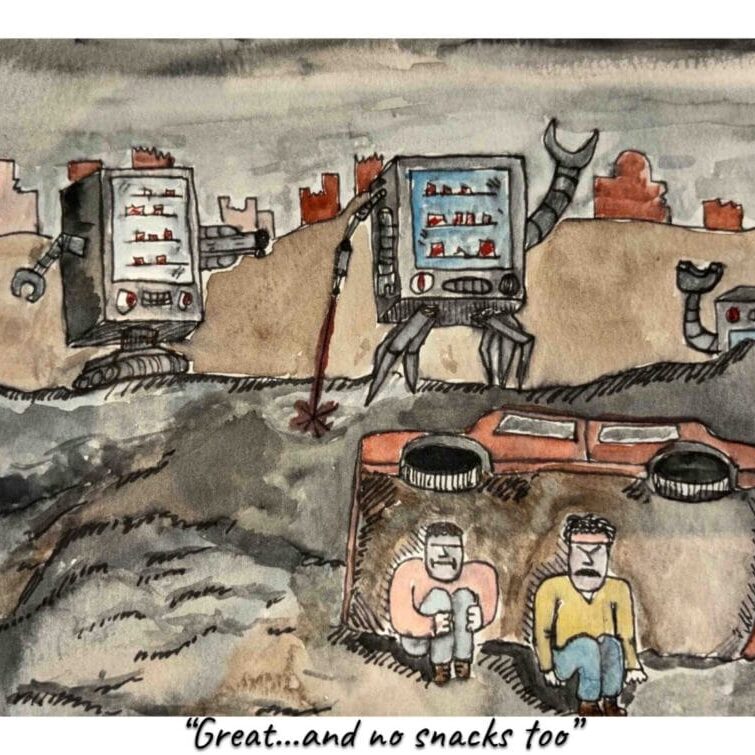
Attack of the Vending Machines!
How far will facial recognition go?
The evidence shows that we are accelerating full steam ahead in a world of watching. It’s going to be hard to resist such change.
You’re standing in line, the sky is grey and smoky, the horizon is littered with apocalyptic-style razed buildings. It’s noon, roll call. You look to your left and see the robotic vending machines (that have taken over society) scanning rows of faces, collecting data and worst of all, filled with only ‘healthy’ options!
You know you have nothing to hide, but as the 7-foot-tall robotic snack machine towers above, scanning your face, you can’t help but feel your heart racing and palms sweating.
OK, this is a bit of a hyperbole, but it begs the question:
How far will facial recognition go?
Recently, the University of Waterloo experienced a fiasco with their vending machines. The machines reportedly used facial recognition technology on its users. The owner of these vending machines, Mars, claimed they didn’t store any information about the people using its vending machines, other than approximate age and gender, for data purposes.
How’s that for reassuring?
The reality of capitalism is a hard to swallow pill, to say the least. The corporate sponsors of vending machines have gone to the extent of data collection with hidden cameras in their vending machines. You can’t even snack in peace these damn days!
Next time you’re swearing at the Howe Hall vending machines for failing to dump out your snack, remember they may be watching.
This isn’t the only case of facial recognition’s use on campuses. China, which seems to be ahead of the surveillance curve, has been using facial recognition within university classrooms; the AI can flag you for shenanigans if it deems you have been cheating during a test. Imagine getting your degree revoked during your final exam due to a glitchy AI.
In 2020, students across the United States protested facial recognition technology on college campuses. China and the US, both with very polar theology when it comes to economics and governance, seem to be facing a somewhat similar issue. One with an overbearing government and the other with overbearing corporate bodies.
Is there anywhere safe from a future of AI surveillance?
A strikingly 1984 Orwelian situation unfolding in Ohio has state crime investigators using facial recognition software to help solve crimes. This method was put on hold due to questions surrounding adherence to civil liberties but may resume in 2025.
Even at home, apps like Facebook and Instagram use AI to help ‘improve user experience,’ a fancy word increasing scrolling and cultivating greater ad revenue for Meta.
AI is used for targeted ad exposure on these platforms, increasing the effectiveness of advertising. If you find yourself in your home surrounded by life-sized crocheted cats, blame AI-targeted advertising.
When we consider how Facebook has used user data for personal purposes, incentives for business deals and for selling to other countries like during the Facebook-Cambridge Analytical data scandal, it’s foolish to think that they aren’t sucking you dry of all the data they can.
Not to mention the Chinese company TikTok, which collects data in a state that has two articles in the State Security Law that permits the Communist Party of China to accede any data held by anyone in China. This being one of the main reasons it’s banned on government devices in Canada and deemed a security risk.
Is the bureaucratic nature of government policies quick enough to restrain AI and these kinds of threats to privacy? I’ll let you be the judge, but Washington seems not to consider it a very big threat. Rep. Don Beyer, Democrat of Virginia, stated that the situation “doesn’t feel urgent for members,” when he attempted to gain support for an audit bill regarding AI usage.
The issue isn’t understood well enough and people are unaware of the real problems. Jay Obernolte, the only Congress member with a Master’s in AI, stated that he believes lawmakers don’t understand the technology.
“You’d be surprised how much time I spend explaining to my colleagues that the chief dangers of A.I. will not come from evil robots with red lasers coming out of their eyes,” he said.
It is important to be aware of the true intention of social media and to be cautious with our digital footprint. We live in uncertain but interesting times. It’s hard to know for certain the outcome but it is fun to speculate.
A true intellect would put some tape over their computer camera and write a book about it.






